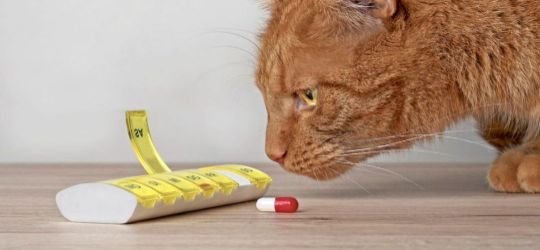

NEVER LEAVE FOOD OPEN AND UNATTENDED
Animals are curious and sometimes the most interesting thing they find to get into is something from the counter, floor, or garbage. Make sure that any food items left out on a countertop or in the open are inaccessible to your animal. Keep lids firmly secured, put away tempting foods like fruit, nuts, and sweets.
Here are the top foods that cause the most pet deaths:
- Coffee, Chocolate, Caffeine
- Xylitol
- Onions, Chives, Garlic, and Leaks
- Grapes, raisins, sultanas, currants
- Alcohol
- Tobacco
Identify Basic Household Pet Poisons
It’s essential to be aware of potential poisons in your home, like cleaning solutions, medications such as painkillers, blood thinners, antihistamines, etc., and vitamins that can be very dangerous for your pet. Please do not keep them in areas accessible by animals, such as tabletops, shelves, or countertops.
Make sure all bottles are labeled correctly and store any potentially hazardous items where your pets cannot get at them. If you have a clever pet that can open cupboards, you can put child locks on the cupboard doors to keep your pet safe. There is also a product by PetSafe called Ssscat that you can use to deter and train cats to stay off countertops.
Common household products that are poisonous to pets:
- Cleaning solutions: Common ingredients in disinfectants such as alcohol, bleach, hydrogen peroxide, and chemical compounds that contain the word “phenol,” etc. are toxic to pets.
- Pest control products: Pest control products can be lethal to pets. Before purchasing or using any pest control products, read the directions and safety use notes.
- Medications
- Painkillers
- Heart medications
- Anti-psychotic drugs
- Antihistamines
- NSAIDS: non-steroidal anti-inflammatory drugs
- Vitamins: Vitamins intended for humans can be toxic to pets if eaten in large amounts. For example:
- Chewable vitamins can be flavored with xylitol.
- Too much vitamin D can result in a very elevated calcium level in your pet’s body, resulting in secondary kidney failure.
- Prenatal vitamins often contain higher levels of iron, which can result in severe vomiting, diarrhea, and even organ damage/failure.
- Too much calcium in a pet can lead to weakness, listlessness, increased drinking and urination, and loss of appetite.
Secure All Dangerous Chemicals, Medicines, and Products
When shopping for products for your pet, be sure to purchase only those products approved or prescribed for your pet.
Although some of the same medications we use can be effective in treating animals, the doses for animals are different and must be precise to the pet’s species, age, weight, etc. When the dosage is wrong or used on an animal without a prescription, it can be fatal for the pet.
Always secure all household chemicals and other hazardous materials out of the reach of pets. If you must use a tick or flea control product on your pet, choose one specifically formulated for them and follow the instructions carefully.
Inspect Outdoor Areas Before Letting Pets Enter
Inspect your outdoor areas and remove any potential hazards before allowing them to roam. Check for yard chemicals such as fertilizers, rocks, plants, mulch, and anything else your pet could explore. Also, watch for animals that pose a danger to pets – snakes, spiders (black widow and brown recluse), and other pests are possible threats. You can call a professional pest control service to remove the problem from your yard if necessary. But let them know you have pets and ask them about the toxicity to pets of the products they use.
Know which outdoor plants are toxic to your pet. Some of the top poisonous plants for pets are:
- Sego Palm
- Castor bean or castor oil plant
- Cyclamen
- Dumbcane
- Hemlock
- English Ivy, both leaves and berries
- Mistletoe
- Oleander
- Thorn apple or jimsonweed
- Bulb plants such as tulips, daffodils, irises, lilies, and hyacinths
Indoor Plants Can Be Pet Poisons
It is nice to decorate your home indoors with houseplants and flowers. There are many you can choose from that are safe for pets. However, you must check if a plant is safe for your pet before bringing it into your home or that any plants poisonous to pets are safely out of their reach. In addition to the plants named above, here are some common poisonous indoor plants:
- Poinsettias
- Aloe Vera
- Corn Plant
- Aloe Vera Plant
- Jade Plant
- Caladium or “Elephant Ear”
- Dieffenbachia or “Dumb Cane”
- Asparagus Fern
Garages and Storage Sheds
Garages and sheds can be loaded with toxic paints, bug sprays, weed killers, etc. If a pet ingests rat or mouse poison, potentially serious or even life-threatening illness can result; therefore, when using any rodenticide, it is important to place the poison in areas completely inaccessible to pets. Some newer rodenticides have no known antidote and can pose significant safety risks to animals and people.
Cars can also leak anti-freeze. As we covered in our December blog: 6 HOLIDAY TIPS TO KEEP YOUR PET’S SAFE, coolant or antifreeze is a lethal poison for dogs and cats and both are attracted to its taste. You must thoroughly clean up spills from your vehicle. Consider using products that contain propylene glycol rather than ethylene glycol.
Recognize the Signs of Poisoning
As a pet owner, you want to keep yourself informed so you can tell as rapidly as possible if your furry friend needs medical attention. These are some of the common things to watch out for:
- Vomiting
- Diarrhea
- Lethargy
- Irregular/stumbling gait
- Lack of appetite or water intake
- Difficulty or irregular breathing
- Coughing up blood
If you see signs that your animal may be poisoned or suspect they ingested something poisonous, don’t wait! Call:
The ASPCA Animal Poison Control: (888) 426-4435 They have all of the poisonous ingredients and treatments to guide you and they are available 24 hours a day, 7 days a week. They can also send us their information and treatment directions so we can all work together to help your pet.
You can also call the Pet Poison Helpline: (855) 764-7661
The faster you act, the better the chances are that your furry family member can make a full recovery.
As an important reminder: do not induce vomiting in your pet after poison ingestion unless you are directed to do so by a trained professional.
Also, please keep our office number, an emergency vet number and Poison Control or Poison Helpline numbers where you can easily find them in case of an emergency.
Final Words
We have provided you some information on pet poisons and how to prevent them. You can also visit the poison control sites we mentioned above for more information on pet poisons. Stay vigilant of foods, products, plants, etc. around your home that could be toxic to your pet. Read labels on household and garden products to ensure they do not contain any substances that could poison your pet.
We care for all pets as if they were our own. Whether you have a furry new puppy or kitten, a senior soul-mate, a routine problem, or a complex, urgent issue, we are here to guide you. Please contact us if you have any questions or need to bring your pet in to our clinic.
Your Friendly Team at
Oak Creek Small Animal Clinic


